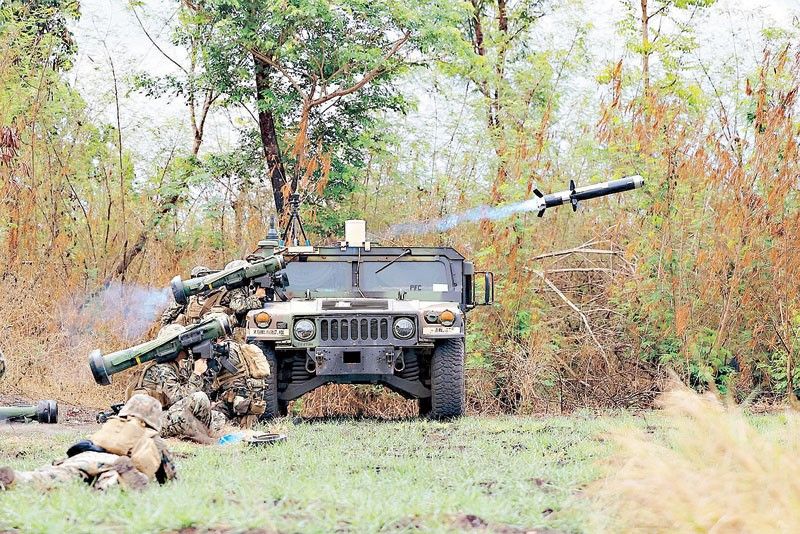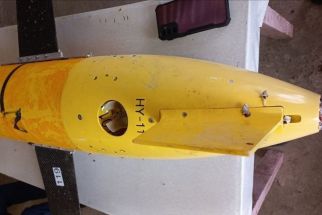China hits US, Philippines over ‘false’ accusations

MANILA, Philippines — China has expressed strong disapproval of the Philippines’ issuing a joint statement with the United States condemning Beijing’s activities in the South China Sea, and warned that “pandering” to forces outside the region, like giving US troops access to more locations in the country under the Enhanced Defense Cooperation Agreement (EDCA), could backfire on Manila.
The joint Philippine-US statement emerged as the two countries’ diplomatic and defense officials convened the third US-Philippines 2+2 Ministerial Dialogue in Washington.
The meeting came as the Balikatan exercise – the largest so far between the countries involving some 17,000 military personnel – officially began early this week. It will conclude on April 28.
“Let me point out first and foremost that China is gravely concerned over and strongly disapproves the joint statement of the US and the Philippines,” Chinese foreign ministry spokesman Wang Wenbin said at a press conference on Wednesday.
“The joint statement of the US and the Philippines misrepresents and discredits the legitimate and lawful maritime law enforcement activities of the Chinese side and even makes false accusations against China. We strongly oppose this,” he said.
“We would like to once again remind the relevant country in the region that pandering to forces outside the region will not bring greater security, but will cause tensions, put regional peace and stability at risk and eventually backfire,” Wang stated.
“We also noted that Philippine President Marcos said China’s reaction over the expanded military deal was ‘not surprising,’” Wang said.
In their joint statement, the Philippines and the US emphasized their strong objections to Beijing’s unlawful maritime claims, its militarization of reclaimed features, as well as provocative activities including its recent attempts to disrupt the Philippines’ lawful operations to resupply its military outpost in the vicinity of Ayungin (Second Thomas) Shoal. Manila and Washington also denounced the swarming of Chinese vessels around islets and land features within the Philippine exclusive economic zone, and called on China to fully comply with the legally binding 2016 ruling of the international arbitral court based in The Hague invalidating China’s massive maritime claims.
Apparently addressing the Philippines, Wang noted that the region’s peace and stability hinge on trust, solidarity, and cooperation and that countries concerned should “take our security firmly in our own hands.”
Wang also claimed the arbitral ruling violates international laws, including the United Nations Convention on the Law of the Sea.
He also slammed the designation of new sites under EDCA. “Judging from the locations of the new military bases, the intention behind those sites is more than obvious,” Wang said.
“The US and the Philippines have just added a footnote to their intention by stressing in the joint statement that they will ‘support swift operationalization of the four new sites.’ It seems there is no need for China to provide any additional analysis or interpretation of that. So indeed there is nothing to be surprised about when it comes to China’s response,” he added.
Galvez at Pentagon
In a statement welcoming his Philippine counterpart Carlito Galvez Jr. to the Pentagon in Arlington County, Virginia on Wednesday, US defense chief Lloyd Austin III again slammed the Chinese’ increasing aggressiveness in the South China Sea.
He also reassured Manila of US commitment to defend the Philippines against any armed attack under the Mutual Defense Treaty.
Austin said the US and the Philippines shared a vision for a free and open Indo-Pacific grounded in transparency, freedom of navigation, the rule of law, respect for sovereignty and the peaceful resolution of disputes.
“Now those principles have faced growing challenges lately. We’ve seen a troubling increase in coercion and dangerous operational behavior, including in the South China Sea. And we remain deeply committed to our alliance obligations,” he said.
“And as we’ve made abundantly clear, the mutual defense treaty applies to armed attacks on either of our armed forces, our public vessels or aircraft anywhere in the South China Sea,” Austin pointed out.
He said he is proud of the rapid strides that the Philippines and the US have made to modernize their alliance and bolster the capacities of their armed forces “to resist coercion and gray zone aggression.”
He said the US and the Philippines are “close to finalizing a security sector assistance roadmap that charts a path forward to strengthen deterrence and align our defense investments with the evolving security environment.”
“And as we discuss yesterday, we’re also expanding our cooperation under the Enhanced Defense Cooperation Agreement, which will make our armed forces more flexible and more resilient. And support our ability to train and operate together,” Austin said.
“And we’re very pleased to have announced the locations of these four new sites recently. And finally, I want to affirm our commitment to strengthening interoperability across all domains, including space and cyberspace,” he added.
Galvez, in response, said the security meeting “is a good opportunity to build on our discussions during your visit in the Philippines… and reaffirm our commitment to the Philippines-US mutual defense treaty.”
“Our regular exchange and close coordination demonstrate the extent of our defense relationship. And I have mentioned on several occasions that the importance of our Philippine-US defense cooperation in the region, especially at this time when significant challenges are becoming increasing complex and evolving,” he said.
“As I have said yesterday, is that our alliance is for peace. Our defense alliance is critical in assuring the safety and security of our citizens, and we continue to work together to enhance our capabilities to meet the current and future security challenges, including disasters,” Galvez said. — Michael Punongbayan
- Latest
- Trending




























